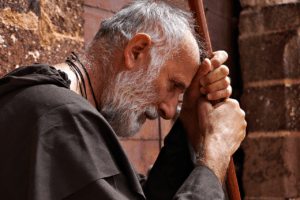Jeremiah 20:10-13 (RM) or 7-13 (RCL); Psalm 69; Romans 5: 12-15 (RM) or 6: 1b-11 (RCL); Matthew 10: 26-33 (RM) or 24-39 (RCL).
Fear. It can take on a life of its own.
I remember one day, lying in bed about to get up, with a full program for the day: the morning in the office, then an afternoon meeting out of town followed by dinner. All of a sudden, as I lay there, my heart started to pound wildly, out of control, as if I’d been running. But I was just lying in bed. It made no sense. It was terrifying. I was sure I was dying of a sudden heart attack at age 27.
Two emergency room visits and one hospital stay later, it wasn’t that at all. It was tachycardia, brought on by – I didn’t know what. Stress? The symptoms of fear were entirely physical, while I lay there perfectly still, thinking “OMG it feels like I’m afraid. But I’m not. Where’s this coming from?” I only gradually unfolded a larger view of where the sources of stress lay. My body knew what my mind took quite a long time to figure out. And my body absolutely screamed for attention.
The fear that gripped Matthew’s Jewish-Christian community must have been palpable – our Gospel passage for today keeps coming back to fear, one way or another. Fear is mentioned in three verses: 26, 28 and 31. Apparently this is how Matthew re-cast his source material from Q, the “Sayings Source.” He also reshaped the material to make a contrast between Jesus’ up-to-then largely hidden ministry, and the public ministry that he was sending out his disciples to do following his resurrection. They would be exposed, dangerously so, liable to misunderstanding, maybe perceived as just as much of a threat to the Pax romana and their own society as Jesus was. These are the guys who would run away when Jesus was arrested, interrogated and crucified. No wonder Jesus is shown insistently reassuring them, “Do not be afraid.”
So just how do you let go of fear? It’s tenacious, sneaky, and creeps up on you just when you think you’ve got it all more or less under control. Fear is a primal instinct, the “flight” end of the “fight or flight” response. Fear can come from one’s, uh, fears – in twelve-step programs they use an acronym, F.E.A.R., “False Evidence Appearing Real” – or it can be entirely justified, and means that you’re honestly facing terrifying realities. And maybe that honesty will save your life, or someone else’s.
The deep level of trust that grounds us and gives us the ability to realistically assess danger, is rooted at least partly in our faith – and in the faith that we are loved deeply and infinitely beyond anything we can imagine. This was to be the source of strength and persistence that gave the early Christians the courage to face sharp divisions within their families caused by their adherence to their new faith.
Even the little passage about sparrows that sounds to modern ears like humans asserting superiority over vulnerable creatures, was simply an example of a conventional rabbinical way of argumentation – contrasting a small matter with a larger one to put the larger one into perspective. Of course the Holy One loves the sparrows, tiny as they are. And of course the Holy One loves us, tiny as we are.
Scripture scholar Dianne Bergant raises some pertinent questions:
“We have not been created and then thrown into the world to fend for ourselves. God cares for us more than for the sparrows. God knows everything there is to know about us: our fears and aversions, our thoughts and dreams. Why is it so hard for us to believe we are cared for by God? Have we not learned that God’s care can be operative side-by-side with hardship? Or do we expect God will swoop into our lives and rescue us from whatever causes our pain? Why do we think God should preserve us from pain rather than strengthen us in it?”
Why indeed?
“Fear no one.” We can’t usually do it from our own limited power, especially when our bodies and everything else is telling us to run. But we can when we stand deeply rooted and grounded in the Source of all Being.
Oh, and don’t forget: never let the bullies win.
© Susan K. Roll
Susan Roll retired from the Faculty of Theology at Saint Paul University, Ottawa, in 2018, where she served as Director of the Sophia Research Centre. Her research and publications are centred in the fields of liturgy, sacraments, and feminist theology. She holds a Ph.D. from the Catholic University of Leuven (Louvain), Belgium, and has been involved with international academic societies in liturgy and theology, as well as university chaplaincy, Indigenous ministry and church reform projects.





Thank you for your reflections on fear and “moving through”. As you said: “My body knew what my mind took quite a long time to figure out.” Since reading your post, I have been thanking God for the multiple ways of knowing each of us has – and praying for the wisdom to be attentive.